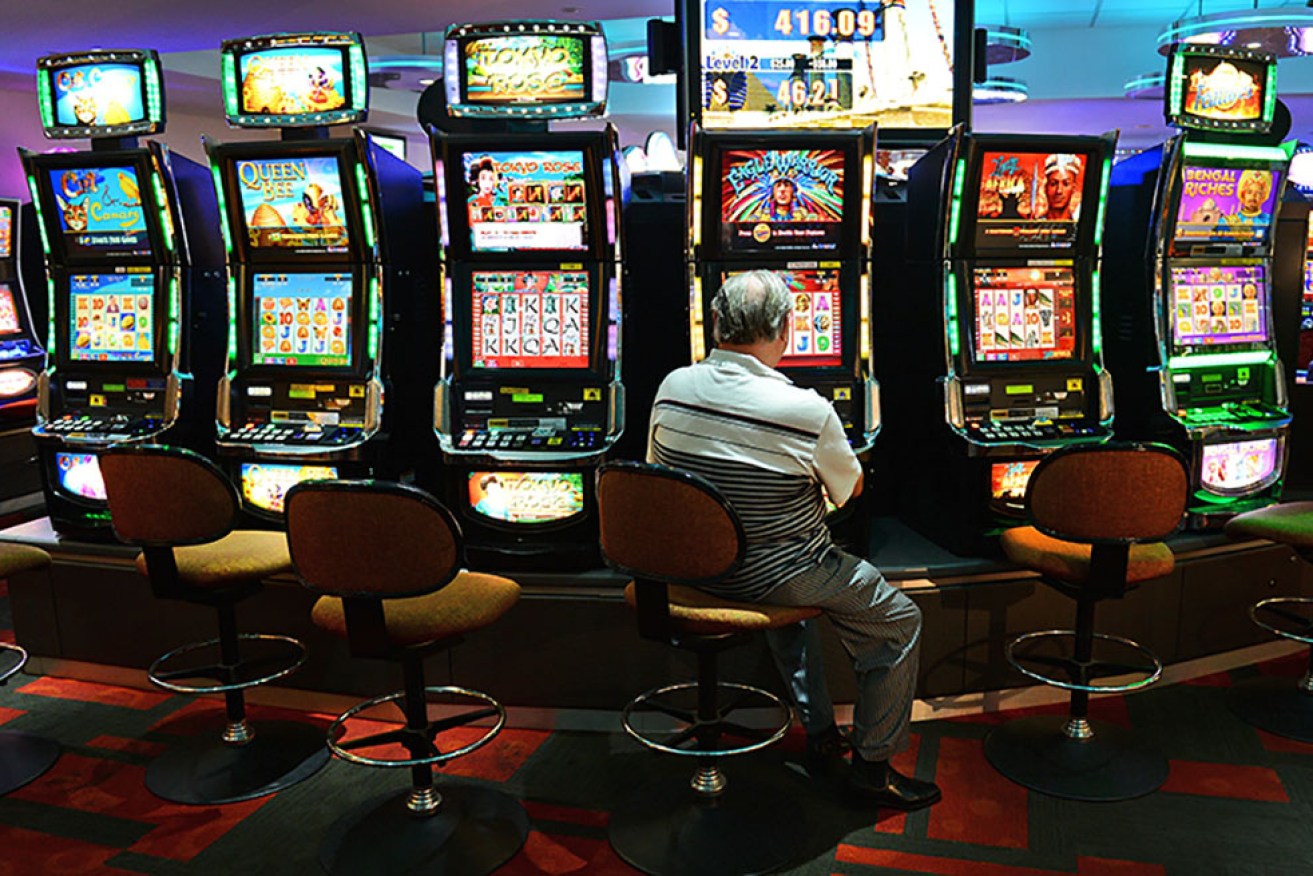Australia’s problem gambling capital is looking for more pokies, and here’s who profits


Sports betting and gambling on poker machines have recovered the fastest post-COVID restrictions. Photo: Getty
I somehow doubt the Northern Territory government understands the irony of proclaiming in its “Code of Practice for Responsible Gambling” that the Territory has the highest rates of problem gambling in the country.
It also boasts the highest rates of moderate risk and low-risk problem gambling.
Looks like the Territory has a gambling problem. One might suspect the Code of Practice isn’t working.
But they never do. The NT effort is full of the usual mixture of tosh and platitudes about making “available information that will allow their patrons to make informed decisions” and allowing people to self-exclude.
Yeah, right.
One might also suspect the last thing a socially-challenged town like Alice Springs needs is more gaming machines, but that’s just what the low-profile fourth force in Australian gambling, Iris Capital, is proposing.
Iris is suddenly dominating gambling in Alice Springs, buying Lasseters’ Hotel Casino last year for $105 million and splashing another $50 million to buy the Todd Tavern, Gap View, Mercure Resort and Diplomat Hotel/Uncles Tavern.
It boosted the number of gaming machines at Lasseters by 132, to 320, and is now awaiting a decision by the NT government on its application for another 40 pokies at its Alice pubs.
The ABC has been steadily reporting locals’ concerns about more machines in a town that already has plenty of problems.
One of the applications is to install 20 machines in the previously pokie-free Uncles Tavern. Among the bodies objecting is the Royal Australasian College of Surgeons.
The human cost
“Surgeons working within Alice Springs health facilities frequently provide care to victims of alcohol- and gambling-related harm,” wrote John Crozier, chair of the RACS National Trauma Committee.
“The applicant opines ‘Within the LCA and LGA there are no significant risk factors in regard to unemployment, housing, education and income’.
“RACS disputes this. Surgeons in Alice Springs attest to the significant social disadvantage of many of the patients for whom they provide care.
“Many of the victims of interpersonal violence often associated with alcohol and gambling-related harm are profoundly socially disadvantaged. The disadvantage in Indigenous communities is often extreme.
“RACS pleads for a higher regard for the concerns and needs of vulnerable individuals and communities with respect to the harms associated with alcohol consumption and gambling than would be demonstrated if this application is approved.”
Iris has plenty of experience with poker machines – among many other things, it owns four of the 20 NSW hotels making the most profit per machine, including the second-most-profitable pokies pub in the state, the Wentworth Hotel in Homebush.
Iris Capital’s owner is 47-year-old former panel beater Sam Arnaout, who burst onto the Australian Financial Review Rich List this year with a $1.89 billion fortune.
Iris is a property developer as well as pub, hotel, gaming and gambling operator. It has been expanding very rapidly in recent years.
Small fry keen to grow
Mr Arnaout told the AFR in May that buying the Alice Springs casino was “just a larger version of what we’re already doing”. Iris already had some 1300 poker machines, as well as the wagering businesses inside its pubs.
The Iris gaming operation is a fraction of the Crown and Star casinos and the Woolworths spin-off, Endeavour Group, with its 12,364 machines – but Mr Arnaout is working on it.
“I’m comfortable with buying one new pub a quarter as long as the economy allows me to, and if there’s headwinds, we can re-evaluate,” he told the AFR.
Mr Arnaout said the probity checks for the Alice Springs casino purchase were “very rigorous”, while the Bergin inquiry into Crown Resorts was fresh in the mind.
Which, in my opinion and with no reflection on the Iris Capital operations, raises the question of how effective the little Northern Territory government might be at keeping an eye on casinos and the mini casinos that are hotels and clubs when all the expertise, experience, money and scale of the Victorian and NSW Governments failed miserably.
Money laundering magnet
Bets pushed through poker machines provides wonderful cash flow – but they are also a magnet for money-laundering operations.
Last year the AFR’s Sue Mitchell reported Crown Resorts and Star moving to cashless gaming could result in Endeavour Group taking a bigger share of the $14 billion poker machine market.
The same benefit could flow to Iris Capital.
“The NSW Independent Liquor and Gaming Authority has confirmed that cashless gaming will become mandatory at Crown and The Star, which have agreed to implement electronic gaming cards linked to gamblers’ identities and bank accounts in a bid to counter money laundering. Other states are expected to follow suit,” Ms Mitchell reported.
While the two casino companies have been hogging the headlines for various nefarious activities, pub and club gaming operations also are handy laundries.
The push against cashless gambling
The NSW Government has been looking at extending cashless gambling to pubs and clubs. Predictably:
“The card has been strongly opposed by ClubsNSW, which estimated it would cost the industry $1.8 billion in revenues, cost $807 million to implement and lead to the loss of 9000 jobs,” Ms Mitchell wrote.
Should NSW go down the cashless gambling road, the Northern Territory could cash in, so to speak.
The Territory already has form in being friendlier for gambling companies. For example, of the 53 licensed interactive gambling providers in Australia, 38 chose to be licensed by the Northern Territory Racing Commission.
Only NSW has a higher rate of poker machines per capita than the NT, where there is already one machine for every 94 people, according to the Alice Springs News.
The NT Government has fixed the taxation rate on electronic gaming machines (EGMs) at 15 per cent – another government addicted to pokies.
Back in little troubled Alice Springs, I will leave the final word to the surgeons:
“Gambling, specifically on EGMs, (electronic gaming machines) in the current Alice Spring venues with the existing numbers of EGMs, is a commonly acknowledged co-variable associated with family violence, which frequently culminates in acts of interpersonal violence requiring surgical care – horrific skull fractures, brain injury, permanently disfiguring facial and jaw fractures, multiple stab wounds – gambling-related harm is more likely, than not, to be increased should this application proceed.”








